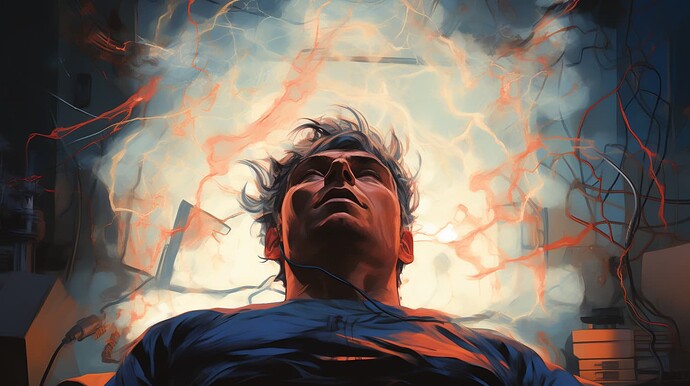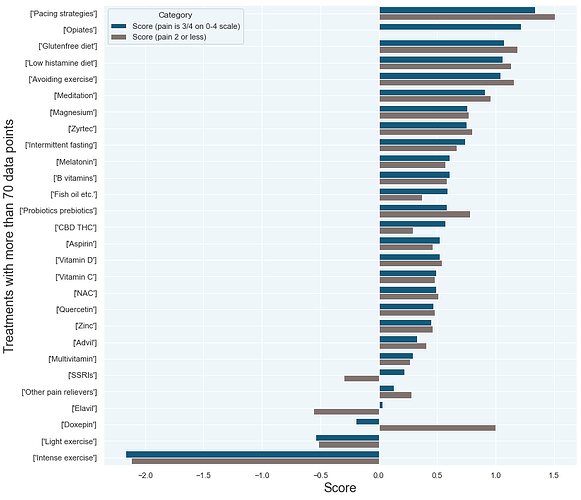Survey data and RCT data suggests that opiates, HBOT, and pacing strategies are among the better treatment for severe pain.
![]() While some doctors like to prescribe gabapentin and doxepin for pain (as well as the SSRIs paroxetine and fluoxetine), patients (on average) don’t like them as much as safer treatments like red light therapy, meditation, etc. They might even cause more harm than good.
While some doctors like to prescribe gabapentin and doxepin for pain (as well as the SSRIs paroxetine and fluoxetine), patients (on average) don’t like them as much as safer treatments like red light therapy, meditation, etc. They might even cause more harm than good.
HBOT is supported by RCT data
HBOT (at 2.0ATA) was proven to have mild benefits on pain in Long COVID patients. See the primer on HBOT for more information on safety issues to watch out for and a link to the Shamir Medical Center study (randomized controlled trial). Pain was one of the outcomes measured in the study and there were (on average) mild benefits.
Survey Data
The graph below shows popular treatments plus less popular treatments that are pain-related:
- opiates (36, 10)
- other pain relivers e.g. gabapentin (70, 18)
- Elavil (34, 9)
- doxepin (5, 2) ← very very low sample size, highly unreliable data
- CBD THC (88, 62)
*The bracketed numbers show the number of people in the severe pain group followed by people without severe pain. It is used to show that sample sizes are very small for certain unpopular treatments.
data from Treatment Outcomes Survey analysis 2023-07-12
Opiates scored highly, but only if the pain was very severe- i.e. pain rated as 3/4 out of 4, where 4 is the worst suffering imaginable. They don’t seem to be a good treatment in people reporting less severe pain. Because they are ‘fun’ drugs that are used recreationally, it’s possible that surveyees rated them higher than they should have (this is just speculation).
For the other treatments, it didn’t really matter if the surveyee experienced severe pain or not.
The psych med-related pain drugs were all rated poorly. Gabapentin fell in the category of “[Prescription] Other pain relievers, e.g. gabapentin” so the data was mixed in with other prescription drugs. Fluoxetine and paroxetine were mixed into SSRIs. Psych meds are generally poorly-rated and patients report high rates of significant worsening, suggesting that these drugs are high-risk.
In healthy people who aren’t Long COVID or ME/CFS, psych meds are known to have devastating side effects. Very debilitating side effects of SSRIs include:
- Suicide
- Possibly linked to the Columbine high school shooting and other school shootings. Some people develop mania while taking SSRIs. David Carmichael murdered his son while on Paxil.
- Severe withdrawal. Please do not stop these drugs suddenly.
- Inability to slowly taper and stay off the drug
- PSSD / Post-SSRI Sexual Dysfunction (there are support groups dedicated to this)
I’m not a fan of psych meds. They generally aren’t approved for the treatment of pain (doctors use them ‘off-label’). Unlike HBOT, there are no clinical trials supporting their use for pain.
‘Do nothing’ treatments and placebo effect treatments
These outperform psych meds. There are a number of treatments that probably don’t do anything or have a small effect. They are probably a better idea than using psych meds off-label for pain.
Some common treatments include: CBD / THC / marijuana related treatments, red light therapy, Tylenol, and meditation.
The placebo effect tends to really work for pain for some people.
Opiates have known problems
Opiates seem to be one of the most effective treatments (though many people don’t respond). However, their problems are well known. They are addictive and lead to withdrawal problems when people trying to get off them.
Some (but not all) safety warnings: Opiates have dangerous interactions with benzodiazepines, which are a popular drug among chronic illness patients. They also interact with some psych meds (TCAs, SSRIs, doxepin), muscle relaxers, alcohol, and antihistamines. Do not take codeine while breastfeeding as it may kill the baby.
These are some serious drugs with black box warnings. You can find the FDA labels for drugs like codeine (2021) online.
Getting access to opiates
I believe that it is fairly easy to buy kratom (a plant-based supplement/product) or O-DSMT (the metabolite of tramadol). However, these drugs will likely have the same problems as opiates. If you don’t have a pharmacist checking your drug interactions, then you can accidentally do dangerous things with these drugs. I’m not a fan of that.
Pacing strategies
You should try avoiding too much exertion (physical, mental, emotional) as it may offer a quick reduction in your symptoms.
Recap
As discussed in an earlier post on ‘brain fog’, a lot of people want to know if there are treatments that target their specific symptoms. For the most part, the targeted treatment approach doesn’t seem to work. High ATA HBOT was rated quite highly on the survey (slightly below pacing strategies) but its benefits, on average, are mild. We just don’t have treatments with high response rates.
Perhaps the best treatment may be an antimicrobial that helps you recover (e.g. from most symptoms). The problem is that we don’t know which treatment that is for you. It would take trial and error to figure out what treatments help you and what treatments hurt you.

